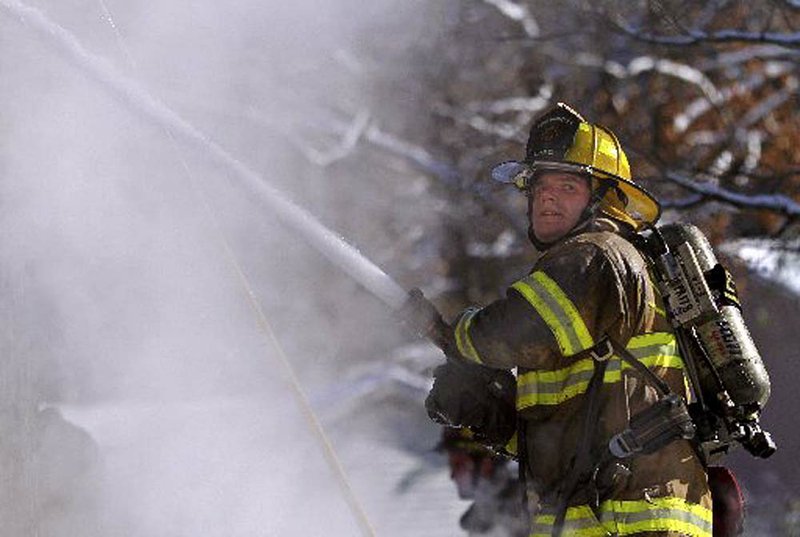LITTLE ROCK — Slush-soaked turnoffs, buried residential roads and snow-packed interstates continued to bring traffic to a lull Thursday and sapped response times for area emergency responders.
Police, fire and emergency medical services officials said they saw average response times slow considerably - some even came close to doubling - and despite some modest thawing Thursday afternoon, officials expected today to be more of the same.
“The streets thawed out a little, but it’s going to freeze hard tonight and create spots of black ice,” Jon Swanson, the director of Metropolitan Emergency Medical Services, said Thursday. “The potential for serious accidents will come back in the morning ... we’ll get around slower, but OK.”
Swanson said his ambulance crews, which serve roughly 425,000 people in and around Pulaski County, usually average six minutes for call times. That figure has nearly doubled to about 11 minutes because of Wednesday’s snow, Swanson said.
But for his paramedics, it’s more important that they get there in one piece.
“It clearly slows us down; we’re not going to drive fast or to the point where we put ourselves in a bad position,” Swanson said. “Better to get there surely and spend a few extra minutes making sure we do get there.”
To counteract slow run times, MEMS added four ambulances to its usual 34-truck rotation, and the regional service even tapped the 10 students currently training at the company’s rookie school to work as auxiliary assistants alongside the certified emergency medical technicians and paramedics on each truck.
Swanson said that on an average day, his crews handle roughly 16 emergency calls per hour. That average climbed to 21 during the peak of the snow Wednesday, but dropped down to 13 calls an hour Thursday.
In North Little Rock and Pulaski County, response times slowed with the snow choked roadways, but emergency dispatchers fielded fewer calls than they did during the last snow.
“Where a call might take us 20 minutes to get there, it’ll take us an hour now,” said Pulaski County sheriff’s office spokesman Lt. Carl Minden. “Thankfully, we’re not seeing a whole lot of calls, fewer than usual ... businesses are closed and no one’s out.”
Little Rock police spokesman Lt. Terry Hastings said officers endured slower response times and had to give priority to accidents with injuries Wednesday.
Even though he couldn’t offer specific numbers, Hastings said the response times persisted Thursday, but that a mild traffic flow resulted in fewer calls than on an average day.
Hastings said he expected that to change this morning.
“Right now it’s been easy; today’s been slow enough we haven’t had any backup,” Hastings said. “I expect in the morning people will be out and adventuring the roads, so we’ll see more accidents [today] than we’ve had all week.”
Little Rock firefighters average five-minute run times on a good day, department spokesman Capt. Jason Weaver said, and the rough road conditions have added at least another minute to their response times.
But those delayed responses were offset by a reduced call volume.
More people stayed home Thursday, which resulted in fewer accidents and fewer residential fires, Weaver said.
On average, the downtown fire station at 624 S. Chester St. in Little Rock takes 10 calls a day. By midafternoon Thursday, firefighters had been to only three calls, Weaver said.
Firefighters in North Little Rock also saw an extra minute tacked onto their response times, but department Fire Marshal John Pflasterer said even at the height of Wednesday’s flurries, his department didn’t have to start prioritizing calls.
“We only had to respond to three accidents Wednesday,” Pflasterer said. “But once people start getting out and try getting into work again Friday, we anticipate the numbers [of accidents] will pick up.”
Arkansas, Pages 11 on 02/11/2011
